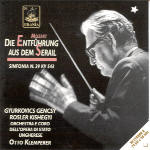Those whose impressions of Otto Klemperer have been formed by his post-1960s recordings are in for an ear-opening experience with this release. (Walter Legge “discovered” Klemperer for the phonograph when the conductor was nearing 70, and as he aged, his approach to whatever he conducted, with no exceptions I can think of, was either slow or slower.) In the late ’40s and up until June, 1950, Klemperer was in residence at the Hungarian State Opera, where this version of Mozart’s Abduction was taped live in March, 1950. It is sung in Hungarian and all of the dialogue (except that which shows up in mid-duet) has been eliminated in this release, with no great loss and making room for a fine Klemperer-led Mozart Symphony No. 39. Oddly, the language never gets in the way of the music, and the performance fills a gap in the Klemperer/Mozart opera discography.
The great surprise (in addition to the strangely good, undistorted, and well-balanced if boxy sound), is in the conductor’s tempos: every musical number receives what is probably its quickest performance on CD, although Klemperer’s unerring sense of drama still distinguishes between the grave and comic moments of the score. Just listen to the second-act finale to hear how mood and tempos change correctly and naturally. We get a breakneck “Martern aller arten”, sung by the light coloratura Maria Gyurkovics (she was a Lucia and Queen of the Night as well), who performs Konstanze with great dash and surprising accuracy throughout the performance. Her Belmonte is the reasonably well-known Endre Rosler, a lyric tenor of great security, firm tone, and good coloratura, and they sing wonderfully together.
The Blonde (Gencsy) is somewhat shrill, the Pedrillo (Kishegyi) is good enough. But the Osmin of Mihaly Szekely is a gem, from top to bottom, and he sings with wonderful “face” and a true comic-villain sense. (There is no Pasha Selim.) The Hungarian State Opera Orchestra and Chorus respond well to Klemperer; this was a well-rehearsed run of performances. The Symphony No. 39, beautifully performed without repeats, is similarly speedy but with a slow movement that is lovely and elegiac. This can’t be anyone’s first or only Abduction, but it’s undeniably fascinating.
































